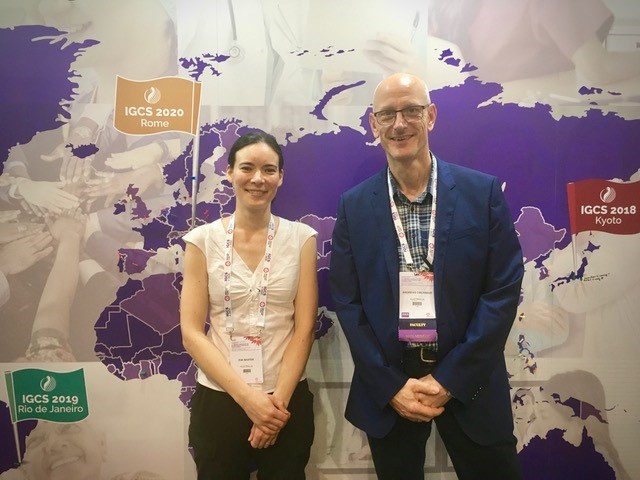Dr Eva Baxter
Eva was preparing for her final PhD oral exam in Edinburgh, Scotland, when she received an email advertisement for a researcher from QIMR Berghofer in Brisbane, Australia. “Moving to Australia to conduct research appealed to my sense of adventure, and before I knew it, I’d had a Skype conversation and was on my way,” Eva says.
Eva had spent most of her childhood in the Netherlands and even at school, she found science fascinating. “I wanted to find out why and how things work the way they do,” she explains. “Medical research appealed to me more than engineering, so I studied biomedical sciences in England and then Scotland. My interests evolved naturally around molecular biology and biochemistry, and I started to build my projects around these areas,” Eva says. Her PhD was in colorectal cancer.
While Eva was working at QIMR Berghofer on breast cancer research, she also started to work on an endometrial cancer project. “We managed to get some funding and soon this research was taking all my time,” Eva says. “Endometrial cancer is under-researched and very interesting.”
In January 2018, Eva started to spread her time between QIMR Berghofer and QCGC Research, which needed her skills to manage the endometrial cancer samples the surgeons gather as part of the feMMe trial. “I was happy to take on this part-time role as it’s a move away from the wet lab to research coordination,” Eva explains. “Research takes a long time – many, many years – and I wanted to see things advance and help people collaborate.”
“With my background in molecular biology, I can make some recommendations about what we can investigate and how we can use the endometrial cancer samples to improve treatment responses,” Eva says. “Ultimately, we want to reach a point where once you’re diagnosed with endometrial cancer, you can do a blood test or a biopsy, and the doctors will have a greater understanding about how you’ll respond to treatment or whether you should opt for surgery straight away. This will give women greater choice and it fits with the trend towards personalised medicine.”
“As there’s no lab at QCGC Research, it’s part of my role to identify who is at the forefront of molecular research in endometrial cancer and bring them together to discuss the project, ” In 2018, Eva was in Japan, where she organised for experts from around the globe to meet face-to-face in Kyoto during the 17th Biennial Meeting of the International Gynaecologic Cancer Society “We have a really good team behind the project and the results are likely to impact treatment across the globe.”
When Eva is not working on research, she loves to hike. After she moved to Brisbane, one of her colleagues introduced her to a local bushwalking group. In 2014, a group of fellow hikers invited her to join them on a trek to Everest Base Camp. “It was phenomenal,” she says. “I had to keep pinching myself to know that I was really there, that I was seeing Everest in person.”
When staff at Cherish found out Eva had already trekked to Base Camp, Eva was invited to speak out the 2019 Cherish Base Camp Trek launch and presented tips and highlights of her own experience. When asked what she’d say to people considering the Cherish Base Camp Trek, Eva replied, “Don’t think twice! Just go. It is one of the highlights of my life.”
There is no doubt that Eva’s research work to improve treatment for women with gynaecological cancer will be another highlight.

